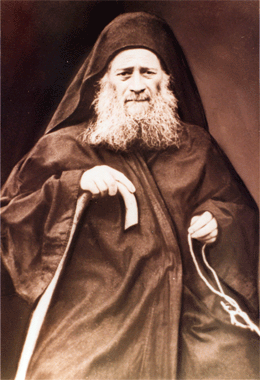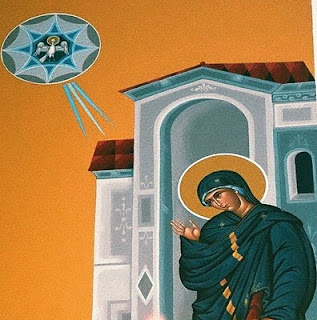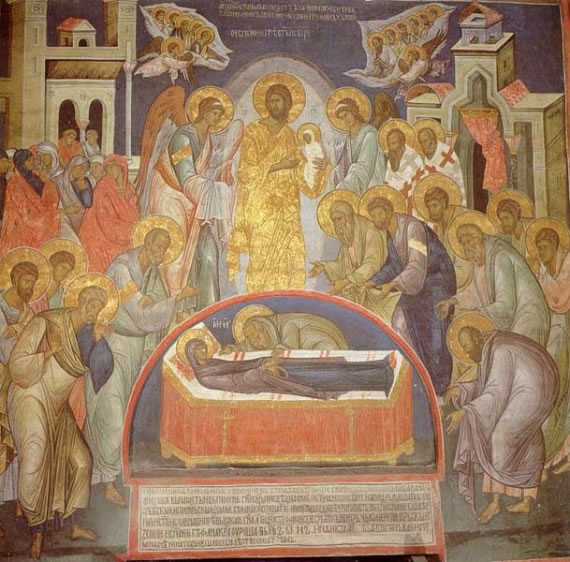
Christ is Born! Glorify Him! I sincerely hope all of you and yours have a wonderful Christmas and a blessed New Year and let us all give thanks and praise to the one who was incarnate for our sakes to break us from the bondage of the evil one!
Last Sunday was the Sunday of Genealogy in the Eastern Rite, where we read Christ's genealogy according to Matthew. The reading serves as proof that the babe that was born in a manger or cave in the city of Bethlehem was not an angel, nor ambassador, nor God in mere appearance of a man, but God AS man. God has human ancestors and a human mother though no human father. Sinners are in this list of genealogy yet God did humble Himself and was born of a virgin and from a line of great murders, adulterers, thieves, traitors and harlots. God comes to dwell among us sinners and has come from a line of sinners. So much for God being a blue blooded, country club member, Republican! (Sorry for the politics!)
And last night, at the Royal Hours of Nativity and the Matins Vigil, we heard the Gospels again about Christ coming into this world as a real human baby. We hear of shepherds and and magi from Persia and angels giving glory to the newborn king. We hear of Mary who gives praise in her Magnificat to God that she would bear a son, though a virgin and then cherishing the gifts of the magi and shepherds. But what do we hear about Joseph? Not a word.
If roles were assigned in a church Christmas Program, I think that the only role worse than that of a shepherd (from the perspective of speaking parts; In a "Charlie Brown Christmas, Shermy resents that every year he has to play a shepherd!) would be Joseph. There is not one single recorded word of St. Joseph in the Scriptures. Make no mistake, he DOES a lot. He is responsible for ensuring that Mary suffers no disgrace and marries her despite being pregnant outside of marriage and for ensuring that Christ is protected from the murdering jealousy of King Herod and raises the Christ as his own though he knows the child is clearly not his. But he is silent. Yet, he does all these things because, as the epistle lesson from the Galatians at the Third Royal Hour proclaims, of his faith. St. Joseph is the epitome of faith.
Despite his overwhelming silence, in the Royal Hours, there are several idiomela hymns where the hymnographers have given Joseph some speeches. Of course, these are elaborations and such is intrinsic to Byzantine hymnography. He laments the shame that he will incur from Mary's pre-marital pregnancy. Still, it his actions and his faith that allow us a glimpse into the whole person of St. Joseph. He takes Mary as his wife and when she gives birth, we read that familiar line that "Joseph did not know Mary until she had given birth to her son." (Matt. 1:24-5).
(Now this verse is often caught in the cross hairs of the debate of Mary as semper virgo. We will not go into that here, though I would point out, very clearly, that those who do not regard Mary as an ever virgin have the onus to prove otherwise. The teaching of Mary as semper virgo has nearly 2000 years of teaching and preaching ascribed to it whereas those who deny it have only been around for 200 years or so and are tainted by a suprarationalism which, in effect, denies that anyone can exist without sexual drives.)
The verb in Greek to know is gignoskein. In the Greek language just as in King James Version English, the word "know" can also be used as a synonym or euphemism to describe sexual intercourse. But why must this verse always be read only in this context? What if we read, in this passage, a journey of Joseph that progresses from faith to knowledge? When Mary gave birth to the Incarnate Word of God, the Emmanuel "God with us", he then realized who she was because of who her Son was. Though ashamed and confused and heartbroken to hear of Mary's pregnant state, he still, by faith, overcame those and protected her and her Son. The knowledge that the Son of God was born from her and confirmed the faithful acts which he had performed. Knowledge is born of the faith.
There is an old Augustinian catchphrase, "Credo ut intellegam" which means "I believe so that I may understand." In the later Middle Ages, some theologians disputed that and reversed it saying "Intellego ut credam" which means "I understand so that I may believe." This was their version of the chicken and the egg! Which comes first--a faith that breeds understanding or a knowledge that allows us to see everything through faith? If St. Joseph is to be used as a type or exemplar, I say that Augustine was right. We believe in order to understand. St. Joseph did all those acts, believed and was lead by his faith and, as a result, truly knew who his wife was from the birth of her Son, our Saviour.
In the forty days of our preparation for the feast of the Nativity, our fast has been supported by our faith in God that He has sent us His Son, the Word, incarnate for our sakes. Last night our faith was confirmed in the Knowledge that only such could be the case. And St. Joseph then knew his wife, intimately, but not sexually as the Theotokos, the "God bearer."
Merry Christmas, everyone!











